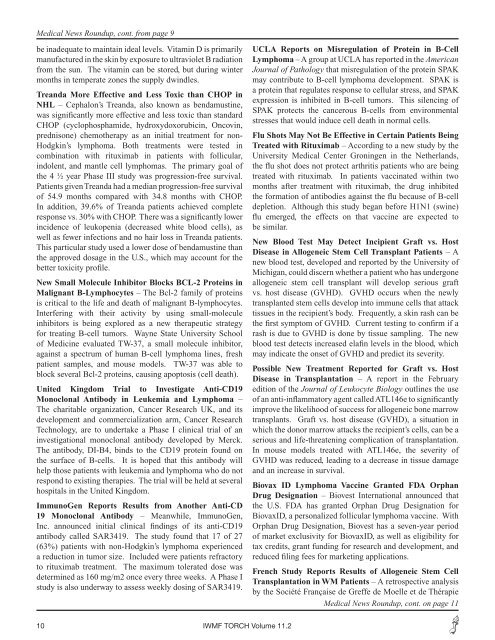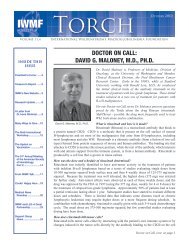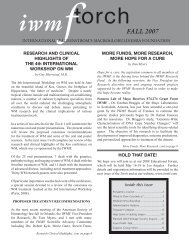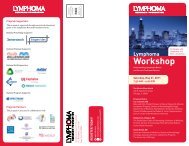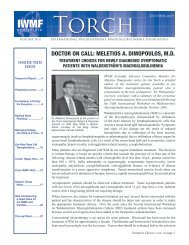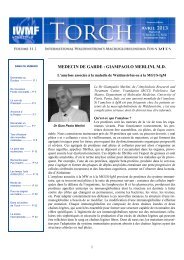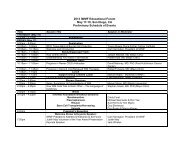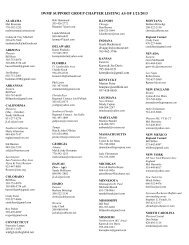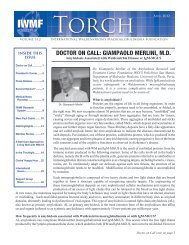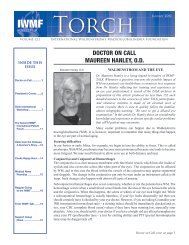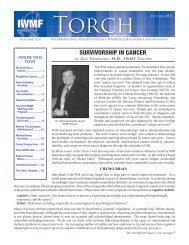English - International Waldenstrom's Macroglobulinemia Foundation
English - International Waldenstrom's Macroglobulinemia Foundation
English - International Waldenstrom's Macroglobulinemia Foundation
Create successful ePaper yourself
Turn your PDF publications into a flip-book with our unique Google optimized e-Paper software.
Medical News Roundup, cont. from page 9<br />
be inadequate to maintain ideal levels. Vitamin D is primarily<br />
manufactured in the skin by exposure to ultraviolet B radiation<br />
from the sun. The vitamin can be stored, but during winter<br />
months in temperate zones the supply dwindles.<br />
Treanda More Effective and Less Toxic than CHOP in<br />
NHL – Cephalon’s Treanda, also known as bendamustine,<br />
was significantly more effective and less toxic than standard<br />
CHOP (cyclophosphamide, hydroxydoxorubicin, Oncovin,<br />
prednisone) chemotherapy as an initial treatment for non-<br />
Hodgkin’s lymphoma. Both treatments were tested in<br />
combination with rituximab in patients with follicular,<br />
indolent, and mantle cell lymphomas. The primary goal of<br />
the 4 ½ year Phase III study was progression-free survival.<br />
Patients given Treanda had a median progression-free survival<br />
of 54.9 months compared with 34.8 months with CHOP.<br />
In addition, 39.6% of Treanda patients achieved complete<br />
response vs. 30% with CHOP. There was a significantly lower<br />
incidence of leukopenia (decreased white blood cells), as<br />
well as fewer infections and no hair loss in Treanda patients.<br />
This particular study used a lower dose of bendamustine than<br />
the approved dosage in the U.S., which may account for the<br />
better toxicity profile.<br />
New Small Molecule Inhibitor Blocks BCL-2 Proteins in<br />
Malignant B-Lymphocytes – The Bcl-2 family of proteins<br />
is critical to the life and death of malignant B-lymphocytes.<br />
Interfering with their activity by using small-molecule<br />
inhibitors is being explored as a new therapeutic strategy<br />
for treating B-cell tumors. Wayne State University School<br />
of Medicine evaluated TW-37, a small molecule inhibitor,<br />
against a spectrum of human B-cell lymphoma lines, fresh<br />
patient samples, and mouse models. TW-37 was able to<br />
block several Bcl-2 proteins, causing apoptosis (cell death).<br />
United Kingdom Trial to Investigate Anti-CD19<br />
Monoclonal Antibody in Leukemia and Lymphoma –<br />
The charitable organization, Cancer Research UK, and its<br />
development and commercialization arm, Cancer Research<br />
Technology, are to undertake a Phase I clinical trial of an<br />
investigational monoclonal antibody developed by Merck.<br />
The antibody, DI-B4, binds to the CD19 protein found on<br />
the surface of B-cells. It is hoped that this antibody will<br />
help those patients with leukemia and lymphoma who do not<br />
respond to existing therapies. The trial will be held at several<br />
hospitals in the United Kingdom.<br />
ImmunoGen Reports Results from Another Anti-CD<br />
19 Monoclonal Antibody – Meanwhile, ImmunoGen,<br />
Inc. announced initial clinical findings of its anti-CD19<br />
antibody called SAR3419. The study found that 17 of 27<br />
(63%) patients with non-Hodgkin’s lymphoma experienced<br />
a reduction in tumor size. Included were patients refractory<br />
to rituximab treatment. The maximum tolerated dose was<br />
determined as 160 mg/m2 once every three weeks. A Phase I<br />
study is also underway to assess weekly dosing of SAR3419.<br />
UCLA Reports on Misregulation of Protein in B-Cell<br />
Lymphoma – A group at UCLA has reported in the American<br />
Journal of Pathology that misregulation of the protein SPAK<br />
may contribute to B-cell lymphoma development. SPAK is<br />
a protein that regulates response to cellular stress, and SPAK<br />
expression is inhibited in B-cell tumors. This silencing of<br />
SPAK protects the cancerous B-cells from environmental<br />
stresses that would induce cell death in normal cells.<br />
Flu Shots May Not Be Effective in Certain Patients Being<br />
Treated with Rituximab – According to a new study by the<br />
University Medical Center Groningen in the Netherlands,<br />
the flu shot does not protect arthritis patients who are being<br />
treated with rituximab. In patients vaccinated within two<br />
months after treatment with rituximab, the drug inhibited<br />
the formation of antibodies against the flu because of B-cell<br />
depletion. Although this study began before H1N1 (swine)<br />
flu emerged, the effects on that vaccine are expected to<br />
be similar.<br />
New Blood Test May Detect Incipient Graft vs. Host<br />
Disease in Allogeneic Stem Cell Transplant Patients – A<br />
new blood test, developed and reported by the University of<br />
Michigan, could discern whether a patient who has undergone<br />
allogeneic stem cell transplant will develop serious graft<br />
vs. host disease (GVHD). GVHD occurs when the newly<br />
transplanted stem cells develop into immune cells that attack<br />
tissues in the recipient’s body. Frequently, a skin rash can be<br />
the first symptom of GVHD. Current testing to confirm if a<br />
rash is due to GVHD is done by tissue sampling. The new<br />
blood test detects increased elafin levels in the blood, which<br />
may indicate the onset of GVHD and predict its severity.<br />
Possible New Treatment Reported for Graft vs. Host<br />
Disease in Transplantation – A report in the February<br />
edition of the Journal of Leukocyte Biology outlines the use<br />
of an anti-inflammatory agent called ATL146e to significantly<br />
improve the likelihood of success for allogeneic bone marrow<br />
transplants. Graft vs. host disease (GVHD), a situation in<br />
which the donor marrow attacks the recipient’s cells, can be a<br />
serious and life-threatening complication of transplantation.<br />
In mouse models treated with ATL146e, the severity of<br />
GVHD was reduced, leading to a decrease in tissue damage<br />
and an increase in survival.<br />
Biovax ID Lymphoma Vaccine Granted FDA Orphan<br />
Drug Designation – Biovest <strong>International</strong> announced that<br />
the U.S. FDA has granted Orphan Drug Designation for<br />
BiovaxID, a personalized follicular lymphoma vaccine. With<br />
Orphan Drug Designation, Biovest has a seven-year period<br />
of market exclusivity for BiovaxID, as well as eligibility for<br />
tax credits, grant funding for research and development, and<br />
reduced filing fees for marketing applications.<br />
French Study Reports Results of Allogeneic Stem Cell<br />
Transplantation in WM Patients – A retrospective analysis<br />
by the Société Française de Greffe de Moelle et de Thérapie<br />
Medical News Roundup, cont. on page 11<br />
10 IWMF TORCH Volume 11.2


